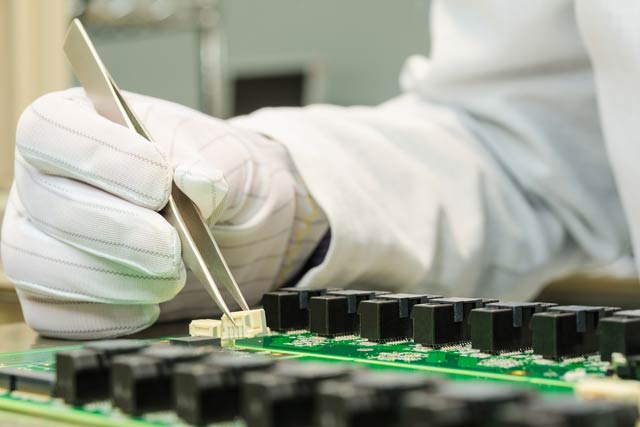
On Monday, March 16, Pauline Overeem, international coordinator of Good Electronics, presented a challenge to the electronics industry in the form of a call endorsed by more than 200 organizations, researchers and activists, demanding meaningful action to prevent harm to workers exposed to toxic chemicals.
Overeem presented the challenge in Brussels, Belgium, at a meeting of the Electronic Industry Citizenship Coalition (EICC), an industry organization whose members include over 100 corporations, including industry giants like Samsung and Apple.
The challenge, lead by Good Electronics and the International Campaign for Responsible Technology (ICRT), comes on the heels of research finding that 35 workers at a Samsung chip plant in South Korea developed leukemia and lymphoma after working with toxic chemicals. Ten have died since the cancer was identified in 2007. Good Electronics reports that 1,000 workers at a now-closed RCA plant in Taiwan contracted cancer, and 157 have died.
Other chemicals regularly used in electronics production, like benzene, a known carcinogen, and n-hexane, are extremely dangerous when handled without proper training and protection. In 2011, the Institute of Public and Environmental Affairs in China reported that workers at two Apple suppliers who had been exposed to n-hexane, then used as a “miracle” cleaning solution for Apple product screens, suffered neurological damage, numbness to limbs, lethargy and an inability to move their bodies. After years of pressure from IPE, Apple banned the use of n-hexane and benzene at its suppliers, but their threat to workers throughout the industry remains.
In February, Nicki Lisa Cole and Jenny Chan reported on the additional problem at Apple suppliers of workers’ exposure to toxic and dangerous aluminum dust, which has the potential to cause serious respiratory ailments and poses a risk of fire and explosion when not properly ventilated.
Though the EICC audits its corporate members, Overeem stated in a March 16 press release that these audits are neither rigorous, nor transparent. Specifically, she said, “These corporate audits don’t uncover chemical exposures and other labor rights violations all the way down the supply chain. There is a clear disconnect between the audits’ findings and the grim reality in many factories. That’s why we are challenging the industry to clean up its act now.”
Another problem within the industry is that many large brands like Apple and Samsung claim, when problems are exposed, that they are unaware of what happens at their suppliers due to the complex, lengthy nature of global supply chains. Ted Smith of ICRT finds this hard to believe, saying, “It’s astonishing that the most technically savvy companies in the world, whose names are on our electronics, say they still don’t know all of the materials used in their own products or in their supply chain production factories. What we need from this important industry is safe jobs and healthy families, where the next generation of children is at least as important as the next generation of chips.”
Those who have signed the challenge call on the industry to take these problem much more seriously and to move forward quickly with real change, rather than with more savvy campaigns of public relations.
The challenge demands that the industry recognize that workers have rights to safe and healthy workplaces, and to know what hazards are present in them; to effective remedies and treatment when they are harmed; and to freely organize and bargain collectively. In addition, it demands that the industry acknowledge the rights of people who live in the communities where production takes place to safe environments and public health.
The challenge outlines six key areas for change and action that it expects big brands, manufacturers and suppliers to address, including transparency; use of safer chemicals; real and effective worker protections; inclusion of workers in management decisions; protection of communities and the environment; and compensation and remediation when people and the environment are harmed. (See here for details of these areas in the full challenge.)
Good Electronics and ICRT have invited members of the EICC to offer feedback on the challenge, and will keep the public updated on progress as this conversation unfolds.
Our most important fundraising appeal of the year
December is the most critical time of year for Truthout, because our nonprofit news is funded almost entirely by individual donations from readers like you. So before you navigate away, we ask that you take just a second to support Truthout with a tax-deductible donation.
This year is a little different. We are up against a far-reaching, wide-scale attack on press freedom coming from the Trump administration. 2025 was a year of frightening censorship, news industry corporate consolidation, and worsening financial conditions for progressive nonprofits across the board.
We can only resist Trump’s agenda by cultivating a strong base of support. The right-wing mediasphere is funded comfortably by billionaire owners and venture capitalist philanthropists. At Truthout, we have you.
We’ve set an ambitious target for our year-end campaign — a goal of $250,000 to keep up our fight against authoritarianism in 2026. Please take a meaningful action in this fight: make a one-time or monthly donation to Truthout before December 31. If you have the means, please dig deep.